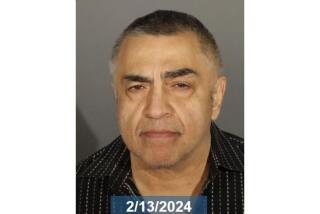‘Victim’ Wasn’t in Her Vocabulary, but She Became One : San Diego: Andrea O’Donnell worked on domestic violence hotlines, studied karate and counseled others to take control of their lives. Then her boyfriend killed her.
SAN DIEGO — For her 27 years, Andrea O’Donnell projected a consistent image to the outside world.
In women’s studies classes and on domestic violence hotlines, in the karate dojo or the weight room, the message in her conduct was clear: Take control of your life.
So when her boyfriend called her mother last year to say he feared he had killed O’Donnell, the mother didn’t believe him. Andrea was nonviolent, but capable of caring for herself.
But Andres English-Howard wasn’t lying. At the time of the call to her mother, who lives hundreds of miles from the San Diego condo he and O’Donnell shared, she had been dead three days. Her decomposed body was found tucked under the covers of her bed, with a cord around her neck and plastic and paper bags over her head.
English-Howard had strangled her, he later admitted. At first, he recanted, then he finally admitted again that he had done it in the heat of a sweat-inducing, eye-bulging, chest-pounding crack cocaine high.
A San Diego County Superior Court jury convicted English-Howard, 31, of premeditated murder this month despite his claims that it was unintentional and the fault of crack.
To her friends, O’Donnell’s death was sadly ironic. Here was a paragon of strength and discipline murdered by a crack-abusing boyfriend who stole her money and repeatedly abused her trust.
“She was embarrassed she didn’t have full control,” said O’Donnell’s mother, Lesley Lane. “She was supposed to be a role model. It’s sad that she felt she didn’t deserve extra help.”
English-Howard led an undisciplined and erratic life, dropping in and out of junior and city colleges over a 10-year period, quitting jobs and taking advantage of women materially and emotionally. He often attributed his failings to racism.
But he did not have an arrest record and his deadly outburst was hardly predictable.
O’Donnell and English-Howard met in 1992 at Cabrillo College outside Santa Cruz. He was active in African American causes, she in women’s issues.
They moved to San Diego to get a fresh start. He wanted to escape the familiar temptation to “puff up” on rock cocaine; she was excited about the women’s studies program at San Diego State University.
O’Donnell impressed those around her with her energy and dedication. On top of a full load of classes, she held two jobs and squeezed her schoolwork into late nights and early mornings.
She ran the university’s Women’s Resource Center, volunteered on Kathleen Brown’s gubernatorial campaign, and arranged for Patricia Ireland, president of the National Organization for Women, to speak on campus.
At the same time, she sold cosmetics at a ritzy department store and loved wearing elegant dresses. In the campus weight room, O’Donnell endeared herself to burly football players and jocks.
“They liked her because they learned from her,” said strength coach Dave Ohton, who remembers O’Donnell recruiting a handful of football players to make hats for a party.
Meanwhile, English-Howard drifted from job to job at a restaurant, a nightclub, an ice cream shop, quitting when he tired of making excuses for his tardiness. And he easily found new places to score crack.
He testified that in the weeks before O’Donnell’s death, he was falling precipitously into another abyss. He began “raging” on their joint ATM account and furiously forging checks belonging to O’Donnell and their roommate, an older, disabled man.
English-Howard’s daily routine consisted of gathering some of his belongings--his old Doc Martens, a pair of pants--taking the bus to Pacific Beach, and selling them to used-clothing shops.
With the $20 or $30 he made, he would take a bus downtown or to Balboa Park and buy drugs.
“I figured I’d smoke till she kicked me out or I left,” he testified. “I wasn’t worried about it. I would deal with the consequences later.”
While he tried to binge discreetly--smoking in the laundry room or in a workplace bathroom--O’Donnell started looking into drug rehabilitation programs for him.
Their relationship crumbled to the point where they slept in separate rooms and barely talked to each other, he said.
“It was just a mess,” English-Howard testified.
His diary entries over the last two years depict a man keenly aware of his crack addiction and of his predilection for using people until they pushed him away, but unable to reform himself.
O’Donnell was a private person, friends said. For all her warmth and outgoing demeanor, she shared little with them about her relationship with English-Howard. It seemed as if she wanted to “save” him from his destructive cycles, they said.
Around 2 a.m. on Nov. 5, English-Howard paced back and forth outside O’Donnell’s bedroom, waiting for her to fall asleep. Then he slipped in, took her ATM card and fled the house, he testified.
“Everything was about to hit the fan,” he said of their imploding relationship, “and I just wanted to have one last blowout.”
He withdrew $200 and went to a nearby crack house, where he bought 11 grams of cocaine.
He smoked some with the seller, then several more pipefuls outside before finally returning to their condo. O’Donnell was waiting for him.
“I was sweating all over the place, eyes bugged out, ears ringing, lights streaking by, adrenaline pumping,” he testified.
She was angry and disgusted, he said, and she began “pushing my buttons,” telling him he had let her down and disappointed his mother and godchild.
She went into her bedroom, and he stayed in the living room, taking a few more hits off the pipe.
“Andrea was just going on and on,” he said. “I was just going to make her chill, make her relax. I wanted her to leave me alone.”
He jumped on top of her and grabbed her around the neck. He testified he heard her say he was hurting her, but “it didn’t register.” He also remembers her calling for her dog.
And then, he said, she was lifeless.
The cord and bags were attempts to make the crime look like the work of an intruder, he testified.
Their roommate discovered O’Donnell’s body and called police two later, when he returned from a brief vacation. The next day--before officers had notified her--English-Howard called O’Donnell’s mother.
Prosecutor Peter Gallagher calls English-Howard a “pathological liar,” saying he knew what he was doing but failed to stop. The drug defense, Gallagher said, is classic English-Howard: blaming everyone and everything but himself.
In the three days after the murder, English-Howard withdrew $500 of O’Donnell’s money from ATM machines in San Diego and Los Angeles. He was denied funds 23 separate times.
Kathy Jones, a professor of women’s studies at San Diego State, taught O’Donnell. She says friends and classmates are mystified by the dichotomy between O’Donnell’s public and private lives. How could such a thing such a thing happen to her, they ask.
Jones argues that human beings have a range of traits, some of which may be contradictory.
“Yes, there is irony,” Jones says of O’Donnell’s death. “But that doesn’t erase the complexity” of her life.
More to Read
Sign up for Essential California
The most important California stories and recommendations in your inbox every morning.
You may occasionally receive promotional content from the Los Angeles Times.










